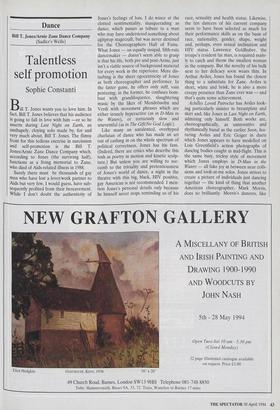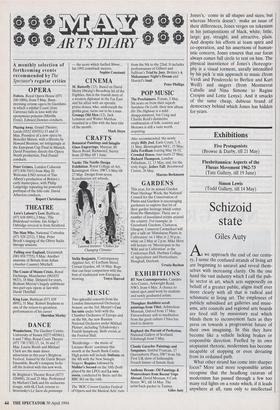Dance
Talentless self promotion
Sophie Constanti
ill T. Jones wants you to love him. In fact, Bill T. Jones believes that his audience is going to fall in love with him —or so he asserts during Last Night on Earth, an unshapely, cloying solo made by, for and very much about, Bill T. Jones. The flimsy front for this tedious exercise in narcissism and self-promotion is the Bill T. Jones/Arnie Zane Dance Company which, according to Jones (the surviving half), functions as a living memorial to Zane, who died of Aids-related illness in 1988.
Surely there must be thousands of gay men who have lost a lover/work partner to Aids but very few, I would guess, have sub- sequently profited from their bereavement. While I don't doubt the authenticity of
Jones's feelings of loss, I do wince at the clotted sentimentality, masquerading as dance, which passes as tribute to a man who may have understood something about agitprop stagecraft, but was never destined for the Choreographers Hall of Fame. What Jones — an equally insipid, fifth-rate dancemaker — doesn't seem able to grasp is that his life, both pre and post-Arnie, just isn't a viable source of background material for every work in the repertoire. More dis- turbing is the sheer egocentricity of Jones as both choreographer and performer. In the latter guise, he offers only stiff, vain posturing; in the former, he confuses bom- bast with grandiloquence, slaughtering music by the likes of Mendelssohn and Verdi with movement phrases which are either inanely hyperactive (as in D-Man in the Waters), or tortuously slow and uneventful (as in The Gift/No God Logic).
Like many an untalented, overhyped charlatan of dance who has made an art out of cashing in on the whole spectrum of political correctness, Jones has his fans. (Indeed, there are critics who describe this tosh as poetry in motion and kinetic sculp- ture.) But unless you are willing to suc- cumb to the triviality and pretentiousness of Jones's world of dance, a night in the theatre with this big, black, HIV positive, gay American is not recommended. I men- tion Jones's personal details only because he himself never stops reminding us of his race, sexuality and health status. Likewise, the ten dancers of his current company seem to have been selected as much for their performance skills as on the basis of race, nationality, gender, shape, weight and, perhaps, even sexual inclination and HIV status. Lawrence Goldhuber, the troupe's resident fat man, is required main- ly to catch and throw the smallest woman in the company. But the novelty of his bulk next to her delicacy soon wears thin. In Arthur Aviles, Jones has found the closest thing to a substitute for Zane. Aviles is short, white and brisk; he is also a more creepy presence than Zane ever was — and that's quite some achievement.
Achilles Loved Patroclus has Aviles look- ing particularly sinister in breastplate and skirt and, like Jones in Last Night on Earth, admiring only himself. Both works are, choreographically, as uninventive and rhythmically banal as the earlier Soon, fea- turing Aviles and Eric Geiger in duets which Jones appears to have modelled on Lois Greenfield's action photographs of dancing bodies caught in mid-flight. This is the same busy, tricksy style of movement which Jones employs in D-Man in the Waters — all fake joy in between near colli- sions and look-at-me solos. Jones strives to create a picture of individuals just dancing together — the kind of thing that another American choreographer, Mark Morris, does so brilliantly. Morris's dancers, like
Jones's, come in all shapes and sizes, but whereas Morris doesn't make an issue of their differences, Jones verges on tokenism in his juxtapositions of black, white; little, large; gay, straight; and attractive, plain. And despite his efforts at team spirit and co-operation, and his assertions of human- istic concern, Jones ensures that our focus always comes full circle to rest on him. The physical insentience of Jones's choreogra- phy is a visual torment, aurally intensified by his pick 'n mix approach to music (from Verdi and Penderecki to Berlioz and Kurt Weill) and singers (from Montserrat Caballe and Nina Simone to Regine Crespin and Lotte Lenya). And it smacks of the same cheap, dubious brand of democracy behind which Jones has hidden for years.



























































 Previous page
Previous page